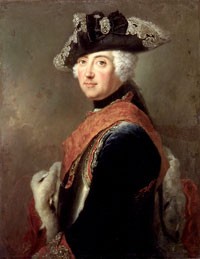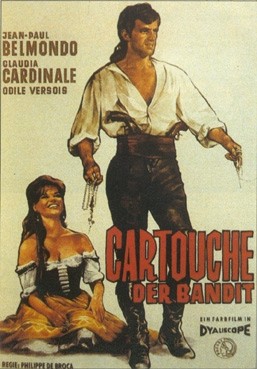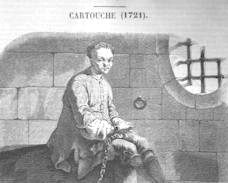|
BIBLIOGRAPHIE PROVISOIRE
Éditions
Luise MÜHLBACH (pseudonyme de
Klara MUNDT, 1814-1873), Berlin und Sanssouci, oder Friedrich der Große
und seine Freunde [in-8°], Leipzig, Voigt & Günther, 1858
[3e édition].
Version anglaise
Luise MÜHLBACH [author of Joseph
II. and his Court, Frederic the Great and his Court, Merchant
of Berlin, etc.], Berlin and Sans-Souci [20 cm, V+391 p.], New
York, D. Appleton & company, 1867.
Rééditions: [23 cm; 302 p., planches], 1890; [22 cm; III+VIII+497
p.], vers 1898. Le site marchand Amazon recense quatorze éditions
de cette version anglaise, dont une recension par Pat LAMKEN (San Francisco,
Californie, USA), «A writer too long forgotten», June
12, 2002 mise en ligne par le site marchand Amazon:
What a pleasure to see
the novels of Louise Muehlbach finally being brought back. Muehlbach, the
pen name of Clara Mundt, was the daughter of one famous historian, and the
wife of another-both professors at the University of Berlin - but in the
early 19th century for a woman to become a professional historian was virtually
impossible. She therefore turned to writing historical novels, and was
one of the best-selling writers in German during the mid-19th century,
producing over 100 books, about two-thirds of which were translated into
English. This in addition to raising 5 children, managing a large household,
and being involved in literary and cultural society! Her work remained popular
as late as the first World War, but as with many popular writers - especially
women - has never been regarded as "serious" and therefore has not survived.
This is regrettable. Her work has, by today's standards, numerous historical
errors - probably unavoidable under the circumstances - and she firmly displays
opinions and prejudices of her own. On the other hand, most of her novels
deal with persons and times only vaguely known to the average English-speaking
reader, and offer a fascinating glimpse into strange worlds. And most important,
she has the one indispensable gift of the novelist - she is a wonderful storyteller,
who keeps the reader turning the pages and wondering what will happen next.
Any reader who enjoys historical novels, or who is interested in German
history should give her work a try.
This particular item - "Berlin and Sans Souci" -
is part of a long series of novels on the Prussian Royal Family. Readers
who are not familiar with the time period may find some of it puzzling. The
publishers probably selected this volume for reprint due to one of the subplots,
which involves a medical student "Lupinus" - who at the moment of his final
exam is revealed to be a woman, and who is nevertheless granted her medical
degree! This is the kind of side excursion the author always loved, and
which adds an erratic charm to her work. Here’s hoping the publishers continue
to add to the series.
|
Édition électronique de la version anglaise
Charles FRANKS & «The Online
Distributed Proofreading Team» [éd.], Louise Muhlbach: Berlin
and Sans-Souci [1020 KB], in The Gutemberg Project [«etext» 4205;
«series by L. Muhlbach» #12], http://www.gutenberg.org/etext/4205,
2003, en ligne en 2005.
Études
Günter MÜHLBERGER & Kurt
HABITZEL «The German Historical Novel (1780-1945)», in Durrani
von OSMAN & Julian PREECE [éd.], The German Historical Novel from
1780 to 1945. Utilising the Innsbruck Database. Travellers in Time and Space.
Reisende durch Zeit und Raum. The German Historical Novel / Der deutschsprachige
historische Roman, Amsterdam, Rudopi [«Amsterdamer Beiträge zur
neueren Germanistik» 51], 2001, pp. 5-23 [dont une réédition
numérique en mode textein Projekt Historischer Roman. The German Historical
Novel (1780-1945), http://histrom.literature.at/docs/kent.html,
en ligne en 2005.
The most productive writer
of the period - and, incidentally, of the historical novel altogether -
was Louise Mühlbach (=Clara Mundt), who published 33 novels in as many
as 174 volumes between 1847 and 1874.
|
Mémoires du baron
von Pöllnitz
(où Cartouche ni Étampes ne paraissent pas
être mentionnés en réalité,
du moins d'après la table des matière des Méoires
du baron)
Charles-Louis, baron de PÖLLNITZ [Karl
Ludwig von PÖLLNITZ, voyagea en Europe de 1710 à 1723; chambellan
de la Cour de Prusse], Mémoires De Charles-Louis Baron De Pollnitz.
Contenant les Observations dans ses Voyages, Et Caractere des Personnes,
les Principales Cours De L’Europe. En 4 volumes [5 vol. in-8°],
Amsterdam, Charles Hoguel, & Compagnie, 1735.
Charles-Louis, baron de PÖLLNITZ, Lettres
et mémoires du Bon de Pöllnitz,... 3e édition...
[5 vol. in-8°], Amsterdam, F. Changuion, 1737.
Karl Ludwig von PÖLLNITZ (var. Carl, var.
POELLNITZ; en français Charles-Louis, en anglais Charles-Lewis),
The memoirs of Charles-Lewis, baron de Pollnitz, being the observations
he made in his late travels from Prussia thro’ Germany, Italy, France, Flanders,
Holland, England, &c.: in letters to his friend: discovering not only
the present state of the chief cities and towns, but the characters of
the principal persons at the several courts [4 volumes: XXIII+431 p.;
472 p.; VI+360 p.; 355 p.; table des matières à la fin de
chaque tome], London [Londres], Daniel Browne, 1739, dont 5 microfiches,
dont une édition numérique en mode image par la BNF sur son
site Gallica, http://visualiseur.bnf.fr/Visualiseur?Destination=Gallica&O=NUMM-103510,
http://visualiseur.bnf.fr/Visualiseur?Destination=Gallica&O=NUMM-103511,
http://visualiseur.bnf.fr/Visualiseur?Destination=Gallica&O=NUMM-103512,
http://visualiseur.bnf.fr/Visualiseur?Destination=Gallica&O=NUMM-103513,
2001, en ligne en 2005.
Albert SAVINE (1859-1927) [éd.],
Un Séjour en France sous Louis XV. Lettres du Baron de
Pöllnitz, annotées d’après les documents d’archives
et les mémoires [in-16; 192 p.; figures], Paris, L. Michaud
[«Collection historique illustrée»], 1909.
Tout complément sera le bienvenu.
Any supplement welcome!
|
 La très
prolixe Luise Mühlbach (1814-1873), de son vrai nom Klara Mundt, a
écrit de nombreux romans historiques dont toute une série,
Friedrich der Große und sein Hof, se passe au 18e
siècle à la cour de Frédéric
de Prusse. Nous reprenons ici dans sa version anglaise un passage du volume
Berlin und Sanssouci, oder Friedrich der Große und seine
Freunde, «Berlin et Sans-Souci, ou Frédéric le Grand
et ses amis».
La très
prolixe Luise Mühlbach (1814-1873), de son vrai nom Klara Mundt, a
écrit de nombreux romans historiques dont toute une série,
Friedrich der Große und sein Hof, se passe au 18e
siècle à la cour de Frédéric
de Prusse. Nous reprenons ici dans sa version anglaise un passage du volume
Berlin und Sanssouci, oder Friedrich der Große und seine
Freunde, «Berlin et Sans-Souci, ou Frédéric le Grand
et ses amis».  "Words, your majesty, are important things.
Once a few words saved me from death; it may be that a few words, spoken
this day to your majesty, may bring me into disfavor, and that would be
worse than death."
"Words, your majesty, are important things.
Once a few words saved me from death; it may be that a few words, spoken
this day to your majesty, may bring me into disfavor, and that would be
worse than death."